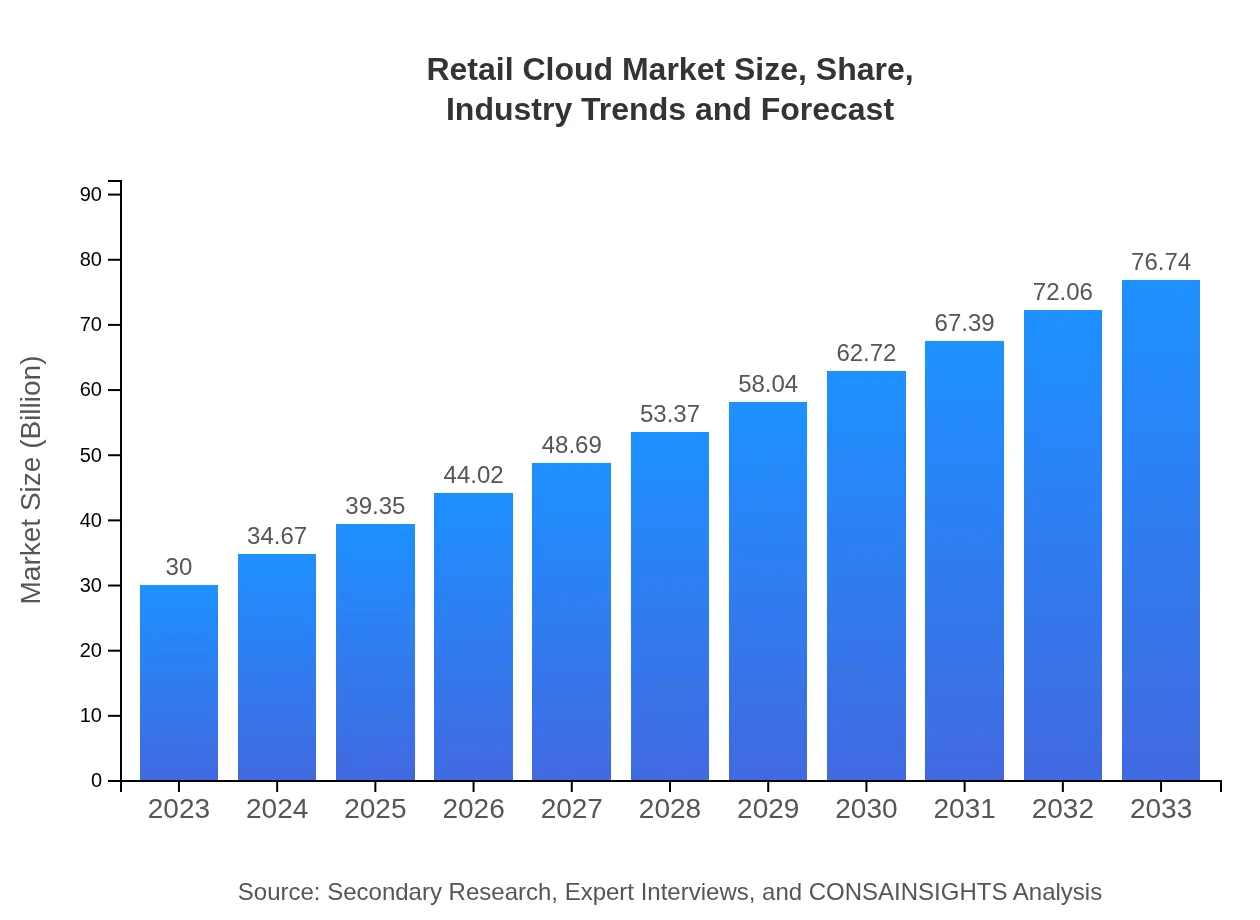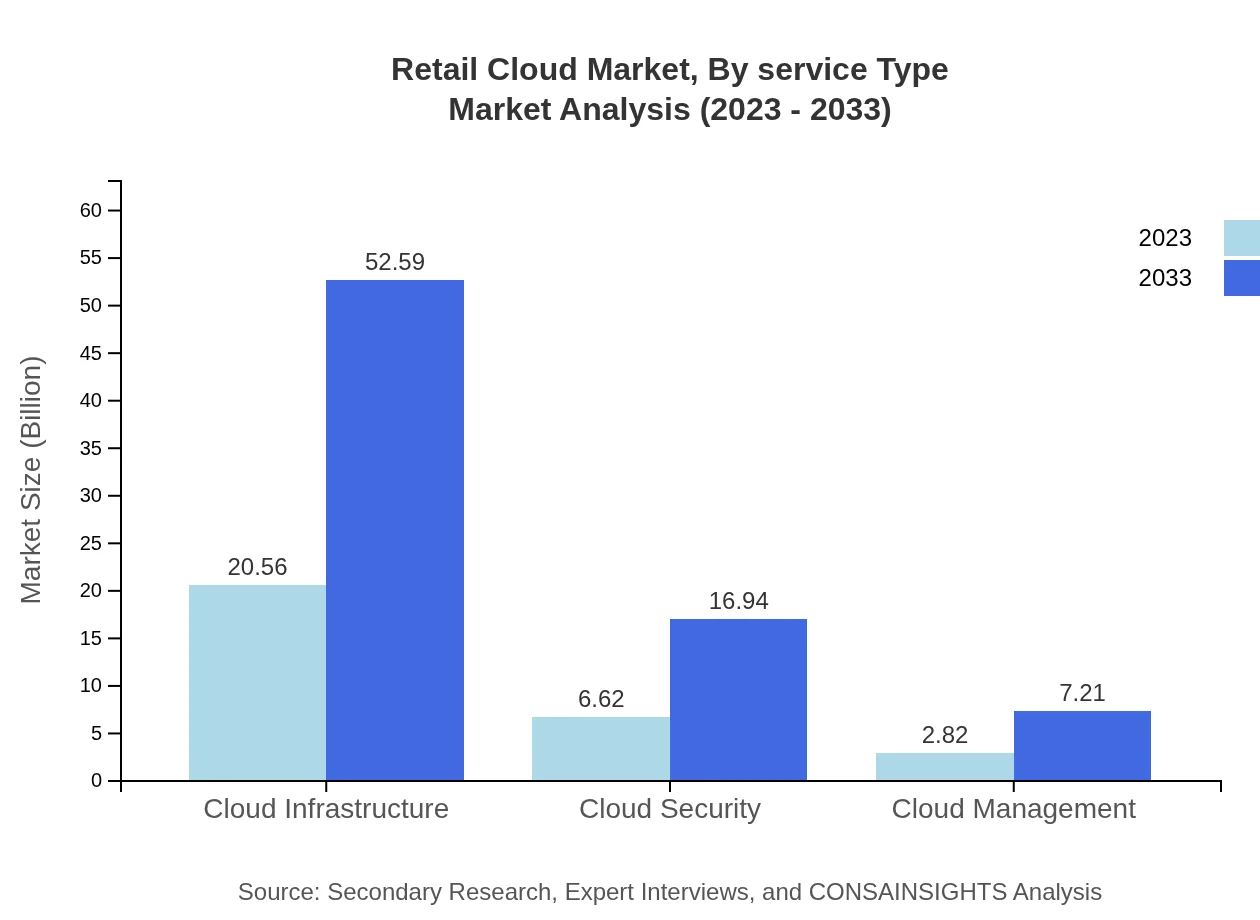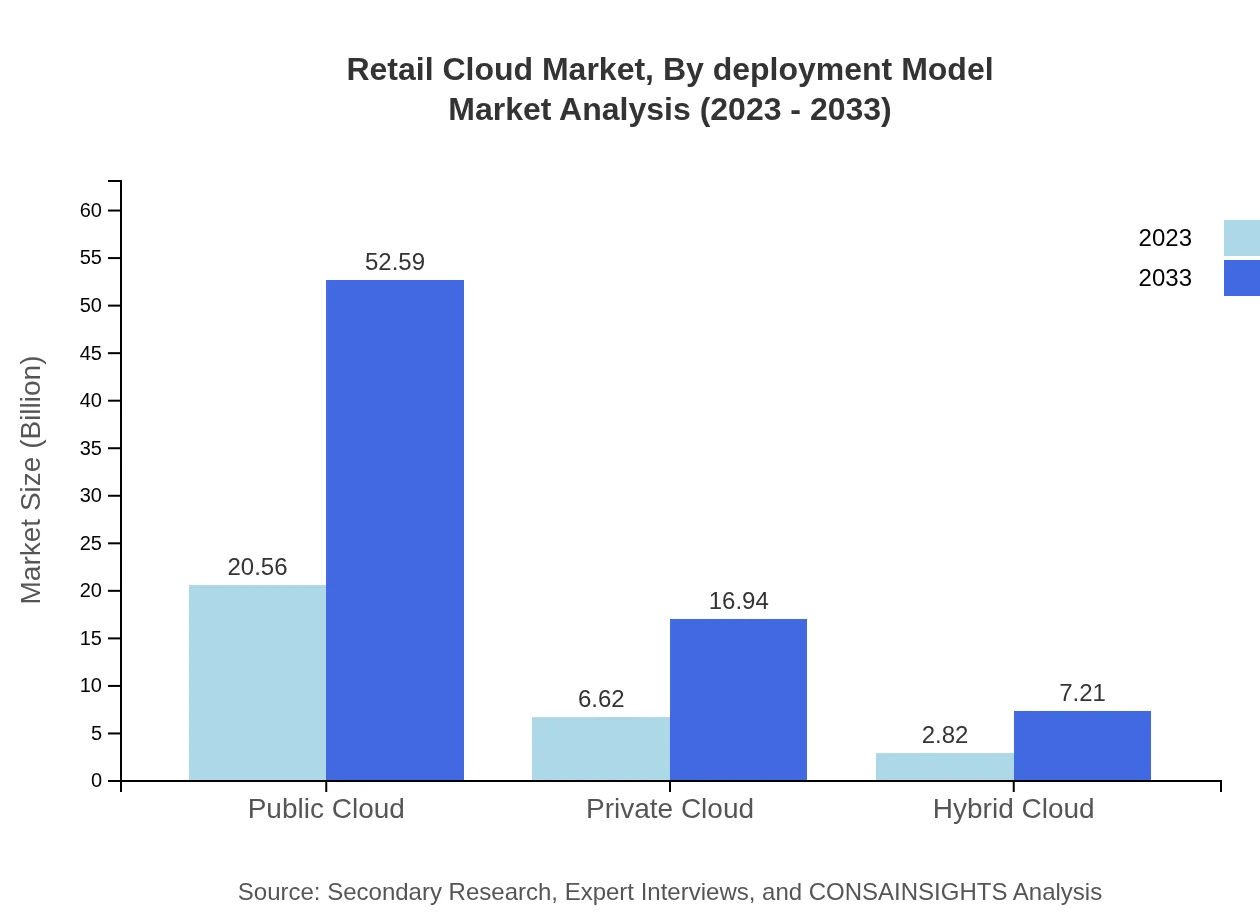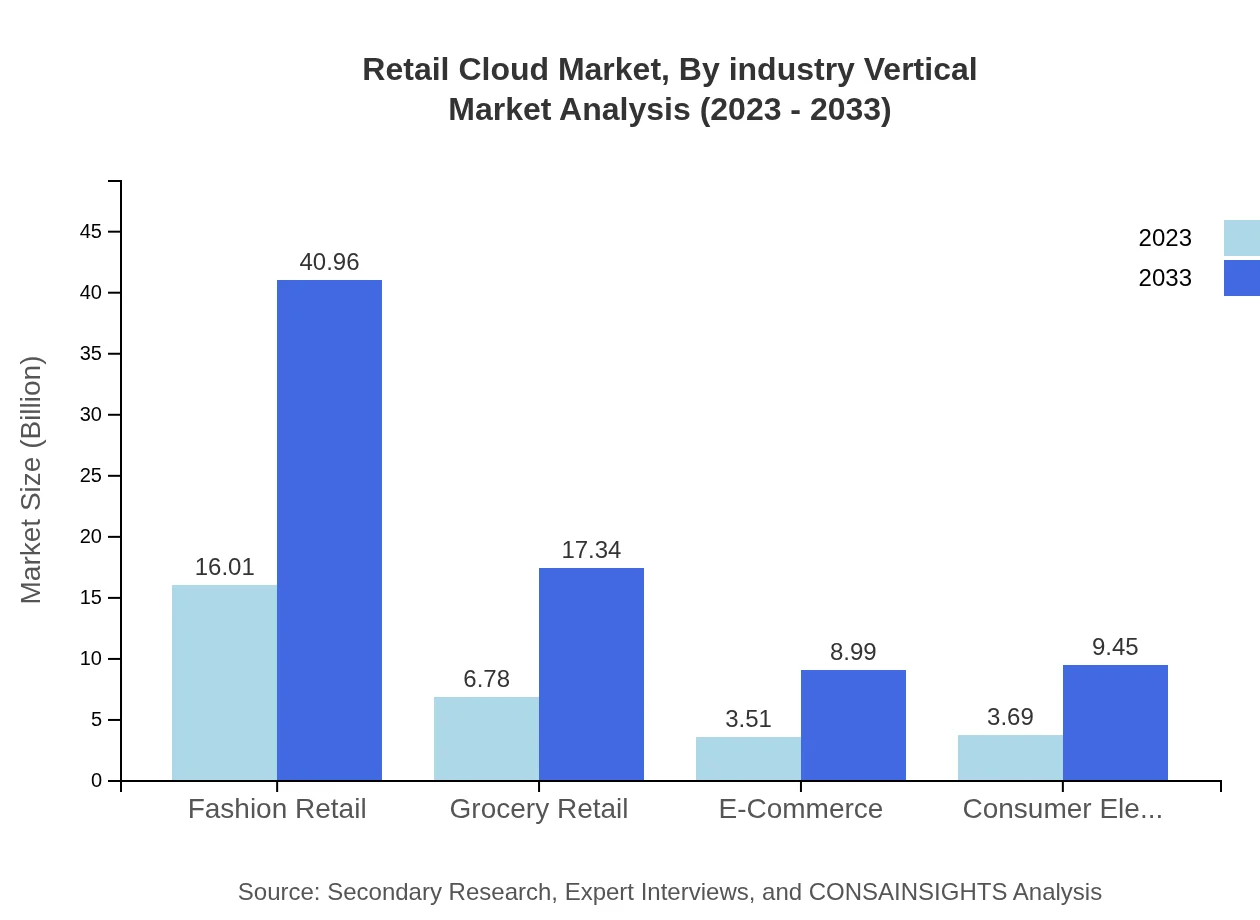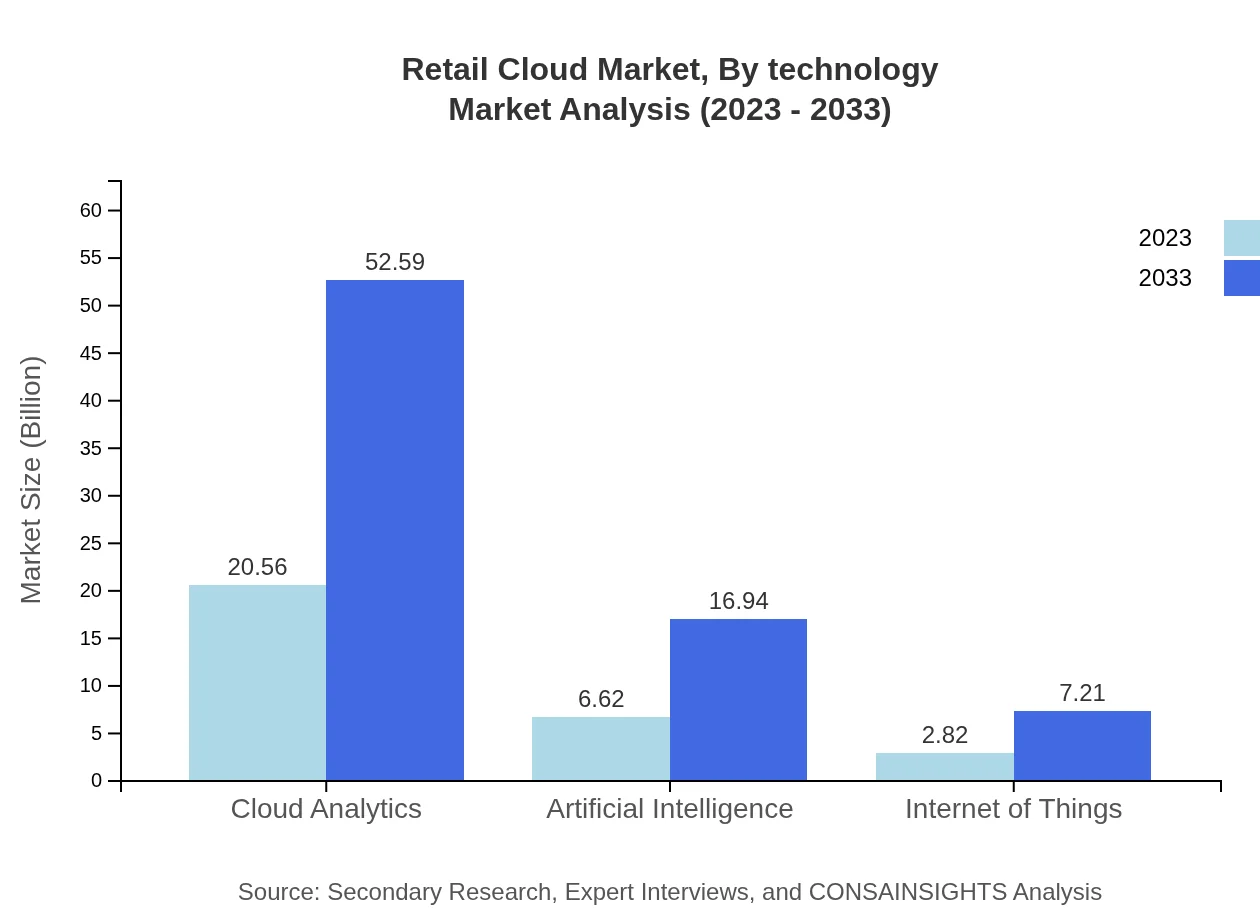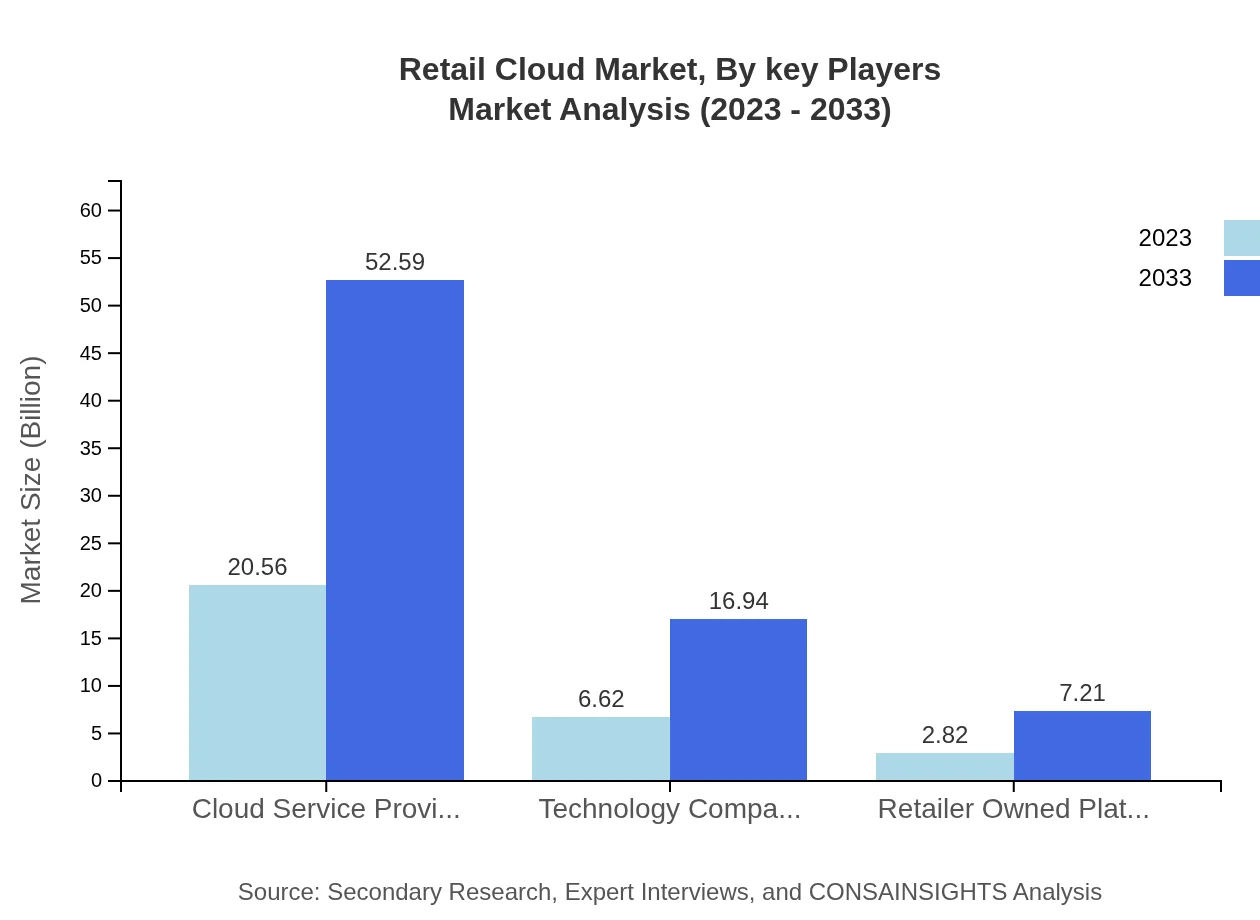Retail Cloud Market Report
Published Date: 31 January 2026 | Report Code: retail-cloud
Retail Cloud Market Size, Share, Industry Trends and Forecast to 2033
This report delves into the Retail Cloud market, providing comprehensive insights and data analysis for the forecast years 2023 to 2033. It includes market size, trends, segmentation, regional analysis, and future forecasts to offer valuable perspectives for stakeholders.
| Metric | Value |
|---|---|
| Study Period | 2023 - 2033 |
| 2023 Market Size | $30.00 Billion |
| CAGR (2023-2033) | 9.5% |
| 2033 Market Size | $76.74 Billion |
| Top Companies | Amazon Web Services (AWS), Microsoft Azure, Google Cloud, IBM |
| Last Modified Date | 31 January 2026 |
Retail Cloud Market Overview
Customize Retail Cloud Market Report market research report
- ✔ Get in-depth analysis of Retail Cloud market size, growth, and forecasts.
- ✔ Understand Retail Cloud's regional dynamics and industry-specific trends.
- ✔ Identify potential applications, end-user demand, and growth segments in Retail Cloud
What is the Market Size & CAGR of Retail Cloud market in 2023?
Retail Cloud Industry Analysis
Retail Cloud Market Segmentation and Scope
Tell us your focus area and get a customized research report.
Retail Cloud Market Analysis Report by Region
Europe Retail Cloud Market Report:
In Europe, the market is projected to grow from $10.87 billion in 2023 to $27.80 billion by 2033. The emphasis on data privacy regulations, such as GDPR, has led retailers to adopt cloud solutions that ensure compliance while enhancing operational efficiency. The UK, Germany, and France are among the leading countries embracing cloud technologies.Asia Pacific Retail Cloud Market Report:
In the Asia Pacific region, the Retail Cloud market is projected to expand from $5.58 billion in 2023 to $14.28 billion by 2033. This growth is fueled by increasing internet penetration, the rapid adoption of e-commerce platforms, and a burgeoning middle-class populace that demands enhanced shopping experiences. Emerging markets like India and China are driving the momentum, with significant investments from key players to develop cloud-based solutions tailored for local retailers.North America Retail Cloud Market Report:
North America holds a substantial share of the Retail Cloud market, anticipated to increase from $9.64 billion in 2023 to approximately $24.66 billion in 2033. The presence of key market players, along with advanced technological infrastructure and a focus on customer-centric retail experiences, is driving substantial investment into cloud solutions.South America Retail Cloud Market Report:
South America is expected to grow from $1.29 billion in 2023 to $3.31 billion by 2033. The retail sector in countries such as Brazil and Argentina is becoming increasingly digital-savvy, with more retailers looking to leverage cloud technology to improve operational efficiencies and engage customers more effectively. The rise of mobile commerce is further propelling this market.Middle East & Africa Retail Cloud Market Report:
The Middle East and Africa market is expected to grow from $2.61 billion in 2023 to $6.68 billion by 2033. As retail in regions like the UAE and South Africa transitions to more digital formats, there is an increasing propensity for cloud-based solutions that can streamline operations and improve customer engagement.Tell us your focus area and get a customized research report.
Retail Cloud Market Analysis By Service Type
The Retail Cloud market by service type includes segments such as cloud infrastructure, cloud security, cloud analytics, and managed cloud services. As of 2023, cloud analytics leads with a market size of $20.56 billion, projected to reach approximately $52.59 billion by 2033. Cloud security and managed services are also pivotal, with growing importance as retailers prioritize data protection and compliance.
Retail Cloud Market Analysis By Deployment Model
Deployment models in the Retail Cloud market include public cloud, private cloud, and hybrid cloud solutions. The public cloud market, offering scalability and cost advantages, is prominent with a size of $20.56 billion in 2023 and expected to grow to $52.59 billion by 2033. Conversely, private and hybrid cloud solutions, accommodating specific compliance and security needs, are on the rise as retailers address varied operational requirements.
Retail Cloud Market Analysis By Industry Vertical
The Retail Cloud market spans several industry verticals, including fashion, grocery, electronics, and e-commerce. The fashion retail segment leads with a market size of $16.01 billion in 2023, projected to grow to $40.96 billion by 2033. Each vertical presents unique challenges and opportunities, driving tailored cloud solutions to enhance sales, customer engagement, and inventory management.
Retail Cloud Market Analysis By Technology
Key technologies impacting the Retail Cloud include Artificial Intelligence (AI), Internet of Things (IoT), and big data analytics. AI is set to grow from $6.62 billion in 2023 to $16.94 billion by 2033, while IoT is experiencing growth from $2.82 billion in 2023 to $7.21 billion by 2033. These technologies are foundational in enabling retailers to analyze consumer behaviors and optimize supply chains.
Retail Cloud Market Analysis By Key Players
The Retail Cloud market features significant contributions from primary players such as Amazon Web Services, Microsoft Azure, Google Cloud, and IBM. Each of these companies has played a pivotal role in advancing cloud solutions, allowing retailers to harness technology for better operational efficiencies and customer engagement.
Retail Cloud Market Trends and Future Forecast
Tell us your focus area and get a customized research report.
Global Market Leaders and Top Companies in Retail Cloud Industry
Amazon Web Services (AWS):
AWS offers scalable cloud computing solutions, enabling retailers to harness data analytics and improve customer experiences.Microsoft Azure:
Azure provides cloud services that allow retailers to utilize machine learning and enhanced data analysis, driving efficiency and personalization.Google Cloud:
With its AI tools and big data solutions, Google Cloud is altering how retailers manage data and engage customers.IBM:
IBM delivers robust cloud platforms and services that focus on AI and security, essential for the evolving retail landscape.We're grateful to work with incredible clients.









FAQs
What is the market size of retail Cloud?
The retail cloud market size currently stands at approximately $30 billion with a projected CAGR of 9.5%. By 2033, the market is expected to expand significantly, driven by increasing digitization in retail operations.
What are the key market players or companies in this retail Cloud industry?
Key players in the retail cloud industry include major technology and cloud service providers who are leveraging AI, IoT, and analytics to offer integrated solutions. These companies are essential in driving innovation and competitiveness in the sector.
What are the primary factors driving the growth in the retail Cloud industry?
The growth in the retail-cloud industry is primarily driven by the rising demand for cloud-based solutions, increasing adoption of AI technologies, and the need for enhanced customer experiences through personalized services and efficient inventory management.
Which region is the fastest Growing in the retail Cloud?
The Asia Pacific region is the fastest-growing area within the retail cloud market, projected to grow from $5.58 billion in 2023 to $14.28 billion by 2033, reflecting a strong demand for cloud services in burgeoning retail ecosystems.
Does ConsaInsights provide customized market report data for the retail Cloud industry?
Yes, ConsaInsights offers customized market report data for the retail-cloud industry. This allows clients to gain tailored insights specific to their business needs, enhancing strategic planning and market responsiveness.
What deliverables can I expect from this retail Cloud market research project?
From the retail-cloud market research project, you can expect comprehensive reports, detailed analysis of market trends, competitor insights, and actionable recommendations that support strategy development and decision-making.
What are the market trends of retail Cloud?
Market trends in the retail cloud sector include increasing adoption of cloud analytics, the integration of AI and IoT, a shift towards hybrid cloud solutions, and a growing emphasis on cloud security measures to protect consumer data.

